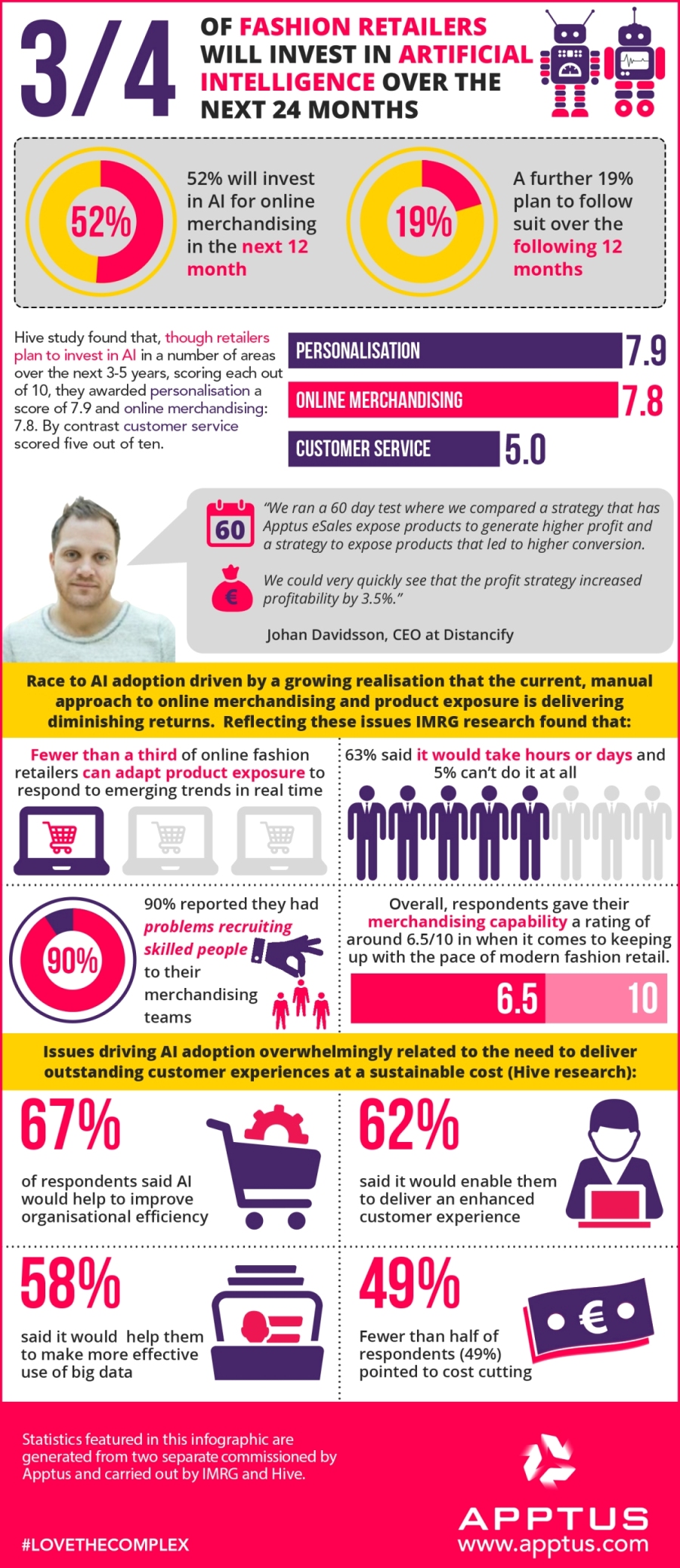Drive to transform online sale performance will see AI investment focus on ‘online merchandising’ and personalisation to deliver ‘real time relevance’
Two separate research studies, funded by Apptus and carried out by IMRG and Hive, have found that fashion retailers are planning significant investment in artificial intelligence (AI) over the  next two years, as they seek to deliver the ‘real time relevant’ customer experiences that are vital to improving sales performance.
next two years, as they seek to deliver the ‘real time relevant’ customer experiences that are vital to improving sales performance.
An IMRG Benchmark study found that:
- 52% will invest in AI for online merchandising in the next 12 month
- A further 19% plan to follow suit over the following 12 months
- Less than a third currently have no plans to invest in merchandising AI.
The study carried out by Hive found that, though retailers plan to invest in AI in a number of areas – online merchandising and personalisation are clear priorities.
Asked to identify the areas of their businesses that will benefit the most from automation in the coming 3-5 years, scoring each out of 10, they awarded personalisation a score of 7.9 and online merchandising: 7.8. By contrast customer service scored five out of ten.
Case Study: An Early Adopter
Swedish fashion brand, Stayhard, has already embraced AI, and seen significant return on its investment. Prior to its AI transformation, the brand faced challenges that will be familiar to most online retailers:
- How to drive sales by delivering an online retail experience that is always relevant, for every customer and every context
- How to see beyond conversion, to link product exposure strategies directly to core business metrics like revenue
- How to do all this without eroding profitability by investing heavily in an expanded team.
In response, Stayhard opted for Apptus eSales. Delivering AI-powered eCommerce Optimisation, Apptus eSales draws on behavioural data and machine learning to adapt product exposure across recommendations, search, navigation and more to individual intent in real time. What’s more, it allows product exposure to be guided by business metrics like revenue and profit, not just conversion.
Johan Davidsson, CEO at Distancify, a key partner for Stayhard said: “We live Apptus eSales. It’s a performance monster that effortlessly copes with peak demand, and we immediately saw sales go up when it was in control of product assortments.
“We ran a 60 day test where we compared a strategy that has Apptus eSales expose products to generate higher profit and a strategy to expose products that led to higher conversion. We could very quickly see that the profit strategy increased profitability by 3.5%.”
Why AI?
Fashion retailers’ race to adopt AI is driven by a growing realisation that the current, manual approach to online merchandising and product exposure is delivering diminishing returns. Conversion rates are in decline, as is customer loyalty, while basket abandonment is on the rise.
In turn, these worrying metrics are, at least in part down to the limitations inherent in a manual approach – where resource is limited, but merchandising and product assortment possibilities are practically endless.
Reflecting these issues IMRG research found that:
- Fewer than a third of online fashion retailers can adapt product exposure to respond to emerging trends in real time
- 63% said it would take hours or days and 5% can’t do it at all
- 90% reported they had problems recruiting skills people to their merchandising teams
- Overall, respondents gave their merchandising capability a rating of around 6.5 out of ten when it comes to keeping up with the pace of modern fashion retail.
Similarly, the Hive study found that the issues driving AI adoption are overwhelmingly related to the need to deliver outstanding customer experiences at a sustainable cost.
- 67% of respondents said AI would help to improve organisational efficiency
- 62% said it would enable them to deliver an enhanced customer experience
- 58% said it would help them to make more effective use of big data
- Fewer than half (49%) pointed to cost cutting.
Commenting on the findings, Andrew Fowler, UK Country Manager at Apptus said: “It’s an uncomfortable truth, but for online fashion retailers with large product ranges the inability to create experiences that delight every customer is costing time, money and sales – and the tried and trusted, manual approach to merchandising is the problem, not the solution.
“At Apptus, we believe that a radical new approach is required: an approach that is already proven in the financial markets, where predictive machine learning is solving the same issues facing retailers – masses of information and not enough people or time to act intelligently on it instantly.
“This research suggests that retailers are taking AI seriously. I’m confident that those that embrace it in the right areas and back it with appropriate organisational change – to deliver experiences that delight customers, while selling more – will be the big winners.”

